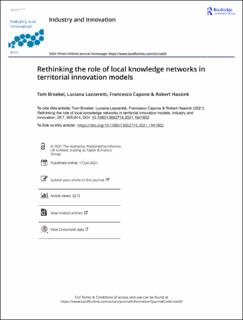| dc.contributor.author | Broekel, Tom | |
| dc.contributor.author | Lazzeretti, Luciana | |
| dc.contributor.author | Capone, Francesco | |
| dc.contributor.author | Hassink, Robert | |
| dc.date.accessioned | 2023-03-08T14:15:53Z | |
| dc.date.available | 2023-03-08T14:15:53Z | |
| dc.date.created | 2021-12-06T09:29:30Z | |
| dc.date.issued | 2021 | |
| dc.identifier.citation | Broekel, T., Lazzeretti, L., Capone, F., & Hassink, R. (2021). Rethinking the role of local knowledge networks in territorial innovation models. Industry and Innovation, 28(7), 805-814. | en_US |
| dc.identifier.issn | 1366-2716 | |
| dc.identifier.uri | https://hdl.handle.net/11250/3057138 | |
| dc.description.abstract | Traditionally, territorial innovation models (Moulaert and Sekia Citation2003), such as clusters, industrial districts, and regional innovation systems, are characterised by a geographic concentration of competences and knowledge as well as by the spatial diffusion of competences and knowledge (Saxenian Citation1994; Sorenson and Stuart Citation2001; Tallman et al. Citation2004; Marshall Citation1920). However, competences and knowledge are not ubiquitous and available to all organisations located within such geographic concentrations. Knowledge, for instance, rather diffuses through internal and external knowledge networks (Giuliani and Bell Citation2005; Giuliani Citation2013; Fitjar and Rodríguez-Pose Citation2017). Consequently, it has been recognised for a long time that a comprehensive understanding of the working and success of territorial innovation systems is only possible when it is based on a framework centred on these systems’ internal and external knowledge networks (Giuliani Citation2005; Glückler Citation2007).
Inspired by this idea, a rich stream of research has emerged that seeks to generate insights into the emergence, working, and structures of such networks. For instance, works in this stream analyse factors explaining the emergence and evolution over time of internal knowledge network relations (Cassi and Plunket Citation2015; Menzel, Feldman, and Broekel Citation2017; Niosi and Banik Citation2005; Plum and Hassink Citation2011; Ter Wal Citation2014), the embeddedness of clusters (and their internal networks) into inter-regional and global knowledge linkages (see many contributions in the special issue by Scherngell (Citation2013); Broekel, Fornahl, and Morrison Citation2015), and the role-specific organisations play in the establishment of such external linkages (Graf Citation2011; Morrison Citation2008).
This special issue contributes to this general debate and aims to rethink the role of local knowledge networks in territorial innovation models unveiling also new research opportunities. It partly consists of papers presented at two international conferences on ‘Rethinking Clusters’Footnote1 in Florence in 2018 and in Padua, in 2019. | en_US |
| dc.language.iso | eng | en_US |
| dc.publisher | Taylor & Francis | en_US |
| dc.rights | Navngivelse 4.0 Internasjonal | * |
| dc.rights.uri | http://creativecommons.org/licenses/by/4.0/deed.no | * |
| dc.title | Rethinking the role of local knowledge networks in territorial innovation models | en_US |
| dc.type | Peer reviewed | en_US |
| dc.type | Journal article | en_US |
| dc.description.version | publishedVersion | en_US |
| dc.rights.holder | The authors | en_US |
| dc.subject.nsi | VDP::Samfunnsvitenskap: 200 | en_US |
| dc.source.pagenumber | 805-814 | en_US |
| dc.source.volume | 28 | en_US |
| dc.source.journal | Industry and Innovation | en_US |
| dc.source.issue | 7 | en_US |
| dc.identifier.doi | 10.1080/13662716.2021.1941802 | |
| dc.identifier.cristin | 1964899 | |
| cristin.ispublished | true | |
| cristin.fulltext | original | |
| cristin.qualitycode | 1 | |

